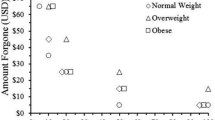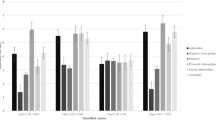Abstract
Social discounting occurs when participants share more of a reward with individuals with whom they are close to, relative to those more distant individuals. Previous social discounting studies have shown consistent effects of drug use and reward magnitude on sharing. However, previous cross-cultural social discounting studies have not incorporated reward magnitude or drug use as factors that may influence discounting. The current experiment randomized 569 American and Japanese university students into either a standard ($150; ¥15,500) or large ($1,500; ¥155,000) magnitude condition where participants made choices about allocating hypothetical rewards to individuals at varying social distances. Participants also self-reported cigarette and alcohol use. There was no social discounting difference between American and Japanese participants at the standard reward magnitude. However, American participants shared more than Japanese participants at the large reward magnitude, replicating a previous study. Only Japanese participants showed a magnitude effect. Including age, gender, or cigarette and alcohol use as covariates did not change the main findings. However, similar to previous social discounting studies, cigarette use was a significant predictor for social discounting. Cross-cultural social discounting differences between American and Japanese participants were accounted for by reward magnitude.


Similar content being viewed by others
Notes
s values, which are analogous to k-values in delay discounting (see Jones & Rachlin, 2006), were also calculated for each subject using nonlinear regression with a hyperbolic model (e.g., Reed, Kaplan, & Brewer, 2012). Only 359 of the 507 (71%) participants’ s-values could be estimated because of both increasing and decreasing indifference points with decreasing social proximity. Therefore, we focused our analysis on AUC. s-values were significantly skewed towards lower values (skewness = 3.93; kurtosis = 18.91). Natural log transformed s-values were normally distributed (skewness = 0.04; kurtosis = 0.14). Mean ln s values are included in the results section as a point of reference and comparison to previous research. However, given the large percentage of participants whose data could not be estimated using nonlinear regression, and the data shown in Fig. 2, the reader is cautioned against any firm conclusions using this data.
The results of a 2 × 2 ANOVA using ln s and only including country and reward magnitude as factors showed the following results. There was no significant main effect for either country (F(1, 355) = 2.31; p = 0.13), reward magnitude (F(1, 355) = 0.95; p = 0.33), or a significant interaction between country and reward magnitude (F(1, 355) = 3.07; p = 0.08). Unlike the AUC data, the larger difference between American and Japanese participants appeared to be at the standard magnitude condition (US μ s = 0.29 [σs = 0.49]; Japan μ s = 0.21 [0.49]), with Japanese participants sharing more than American participants. At the large magnitude condition (US μ s = 0.23 [0.38]; Japan μ s = 0.21 [0.29]), there was little difference between the two groups.
The results of the 2 × 2 ANCOVA using ln s were identical to that using ln AUC. That is, only cigarette use (F = 5.22, p = 0.02) and the interaction between country and magnitude (F = 7.99, p < 0.01) were significant predictors of ln s.
References
Baumeister, R. F. (2005). The cultural animal: Human nature, meaning, and social life. New York: Oxford University Press.
Bickel, W. K., Jarmolowicz, D. P., Mueller, E. T., Franck, C. T., Carrin, C., & Gatchalian, K. M. (2012a). Altruism in time: social temporal discounting differentiates smokers from problem drinkers. Psychopharmacology, 224, 109–120.
Bickel, W. K., Jarmolowicz, D. P., Mueller, E. T., Koffarnus, M. N., & Gatchalian, K. M. (2012b). Excessive discounting of delayed reinforcers as a trans-disease process contributing to addiction and other disease-related vulnerabilities: emerging evidence. Pharmacology & Therapeutics, 134, 287–297.
Bickel, W. K., Wilson, A. G., Franck, C. T., Mueller, E. T., Jarmolowicz, D. P., et al. (2014). Using crowdsourcing to compare temporal, social temporal, and probability discounting among obese and non-obese individuals. Appetite, 75, 82–89.
Bradstreet, M. P., Higgins, S. T., Heil, S. H., Badger, G. J., Skelly, J. M., et al. (2012). Social discounting and cigarette smoking during pregnancy. Journal of Behavioral Decision Making, 25, 502–511.
Charlton, S. R., Yi, R., Porter, C., Carter, A. E., Bickel, W., & Rachlin, H. (2013). Now for me, later for us? Effects of group context on temporal discounting. Journal of Behavioral Decision Making, 26, 118–127.
Du, W., Green, L., & Myerson, J. (2002). Cross-cultural comparisons of discounting delayed and probabilistic rewards. The Psychological Record, 52, 479–492.
Green, L., & Myerson, J. (2004). A discounting framework for choice with delayed and probabilistic rewards. Psychological Bulletin, 130, 769–792.
Green, L., Myerson, J., & Vanderveldt, A. (2014). Delay and probability discounting. In F. K. McSweeney, & E. S. Murphy (Eds.), The Wiley Blackwell handbook of operant and classical conditioning (pp. 307-337). Wiley-Blackwell.
Ito, M., Saeki, D., & Green, L. (2011). Sharing, discounting, and selfishness: A Japanese-American comparison. The Psychological Record, 61, 59–76.
Johnson, M. W., & Bickel, W. K. (2008). An algorithm for identifying nonsystematic delay-discounting data. Experimental and Clinical Psychopharmacology, 16, 264–274.
Jones, B. A., & Rachlin, H. (2006). Social discounting. Psychological Science, 17, 283–286.
Jones, B. A., & Rachlin, H. (2009). Delay, probability, and social discounting in a public goods game. Journal of the Experimental Analysis of Behavior, 91, 61–73.
Kirby, K. N., Petry, N. M., & Bickel, W. K. (1999). Heroin addicts have higher discount rates for delayed rewards than non-drug-using controls. Journal of Experimental Psychology: General, 128, 78–87.
Locey, M. L., Jones, B. A., & Rachlin, H. (2011). Real and hypothetical rewards in self-control and social discounting. Judgment and Decision Making, 6, 552–564.
Ma, Q., Pei, G., & Jin, J. (2015). What makes you generous? The influence of rural and urban rearing on social discounting in China. PLoS One, 10(7), e0133078. doi:10.1371/journal.pone.0133078.
MacKillop, J., Amlung, M. T., Pryor, L. R., Ray, L. A., Sweet, L. H., & Munafo, M. R. (2011). Delayed reward discounting and addictive behavior: A meta-analysis. Psychopharmacology, 216, 305–321.
Madden, G. J., & Bickel, W. K. (2010). Impulsivity: The behavioral and neurological science of discounting. Washington, DC: American Psychological Association.
Mazur, J. E. (1987). An adjusting procedure for studying delayed reinforcement. In M. L. Commons, J. E. Mazur, J. A. Nevin, & H. Rachlin (Eds.), Quantitative analyses of behavior: The effect of delay and of intervening events on reinforcement value (Vol. 5, pp. 55–73). Hillsdale: Erlbaum.
Myerson, J., Green, L., & Warusawitharana, M. (2001). Area under the curve as a measure of discounting. Journal of the Experimental Analysis of Behavior, 76, 235–243.
Olsen, E. A., Rosso, I. M., Demers, L. A., Divatia, S., & Killgore, W. D. S. (2016). Sex differences in psychological factors associated with social discounting. Journal of Behavioral Decision Making, 29, 60–66.
Osinski, J. (2010). Social discounting: the effect of outcome uncertainty. Behavioural Processes, 85, 24–27.
Ostaszewski, P., & Osinski, J. T. (2011). Social discounting of monetary rewards: The effects of amount and social relationship. European Psychologist, 16, 220–226.
Rachlin, H., & Jones, B. A. (2008a). Altruism among relatives and non-relatives. Behavioural Processes, 79, 120–123.
Rachlin, H., & Jones, B. A. (2008b). Social discounting and delay discounting. Journal of Behavioral Decision Making, 21, 29–43.
Rachlin, H., & Raineri, A. (1992). Irrationality, impulsiveness, and selfishness as discount reversal effects. In G. Loewenstein & J. Elster (Eds.), Choice over time (pp. 93–118). New York: Russell Sage Foundation.
Reed, D. D., Kaplan, B. A., & Brewer, A. T. (2012). A tutorial on the use of Excel 2010 and Excel for MAC 2011 for conducting delay-discounting analyses. Journal of Applied Behavior Analysis, 45, 375–386.
Strombach, T., Jin, J., Weber, B., Kenning, P., Shen, Q., Ma, Q., et al. (2014). Charity begins at home: Cultural differences in social discounting and generosity. Journal of Behavioral Decision Making, 27, 235–245.
Tan, C. T., & Johnson, R. D. (1996). To wait or not to wait: The influence of culture on discounting behavior. In W. H. Loke (Ed.), Perspectives on judgement and decision making (pp. 97–106). Lanham: Scarecrow.
Wainwright, K., & Romanowich, P. (2016). The relationship between perfectionism and discounting measures. Personality & Individual Differences, 101, 407–412.
World Health Organization. (2012). WHO World drug report.
World Health Organization. (2013). WHO Report on the global tobacco epidemic.
World Health Organization. (2014). WHO Global status report on alcohol and health.
Yi, R., Carter, A. E., & Landes, R. D. (2012). Restricted psychological horizon in active methamphetamine users: Future, past, probability, and social discounting. Behavioural Pharmacology, 23, 358–366.
Yi, R., Mitchell, S. H., & Bickel, W. K. (2010). Delay discounting and substance abuse dependence. In G. J. Madden & W. K. Bickel (Eds.), Impulsivity: The behavioral and neurological science of discounting (pp. 191–211). Washington, DC: American Psychological Association.
Author information
Authors and Affiliations
Corresponding author
Ethics declarations
All participants were informed of their rights as human participants in a psychology experiment. Institutional review board acceptance was obtained before data collection at the University of Texas at San Antonio, and after data collection at Ryutsu Keizai University, which is standard practice for each institution, respectively.
Conflicts of Interest
On behalf of all authors, the corresponding author states that there is no conflict of interest.
Funding
No funding was used for data collection or analysis.
Rights and permissions
About this article
Cite this article
Romanowich, P., Igaki, T. Effects of reward magnitude, alcohol and cigarette use on social discounting in Japan and United States college students. Psychol Rec 67, 345–353 (2017). https://doi.org/10.1007/s40732-017-0218-3
Published:
Issue Date:
DOI: https://doi.org/10.1007/s40732-017-0218-3




